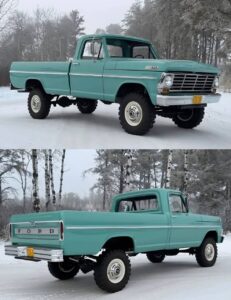
The Wintergreen Ghost: A Story of Memories and Redemption
Elijah always remembered the way the old Ford rumbled down the snowy backroads of his childhood. It was more than just a truck to him—it was a symbol of everything he held dear. The crisp winter air, the scent of pine from the nearby forest, and the warm laughter of his grandfather, Henry, as they drove along the winding paths of their small mountain town. The truck had been there for every adventure, every lesson, every moment that truly mattered.
It was 1972 when Henry first brought the truck home. Fresh off the lot, its wintergreen paint gleamed in the sunlight, its chrome details reflecting the world like a mirror. Elijah was just a small boy then, barely able to peek over the dashboard, but the moment he saw it, he knew it was special. His grandfather always called it “The Workhorse,” but to Elijah, it was more like a mythical beast, capable of conquering any terrain.
Together, they rode through thick forests, crossed frozen rivers, and climbed steep hillsides. Whether it was hauling firewood, picking up supplies from town, or simply taking a long, winding drive at sunset, the truck was always a part of their lives. Henry would let Elijah sit on his lap, hands barely able to grip the wheel, and teach him how to steer as they made their way home. “A truck like this,” Henry always said, “ain’t just for work. It’s for living.”
Years passed, and the world changed. Elijah grew up, went to college, and left the small town behind. Life had a way of moving fast, and before he knew it, he had a career, a family, and responsibilities that kept him away. The farmhouse sat empty more often than not, and the truck—once so full of life—was left in the barn, gathering dust and rust.
Then, one cold winter evening, Elijah got the call. His grandfather had passed away.
The funeral was quiet. The town had changed, faces unfamiliar, but the farmhouse remained, standing tall against the snow-covered fields. After everything was said and done, Elijah found himself wandering into the old barn. And there, beneath years of dust and neglect, was the truck. The sight of it sent a wave of memories crashing over him.
He ran a hand over the hood, feeling the rough surface beneath his fingertips. The paint had faded, the tires were flat, and the seats were torn, but it was still there—still waiting. It was as if it had been holding onto something, waiting for him to come back, waiting for one last journey.
That night, Elijah made a promise to himself. He wasn’t going to let the truck rot away like some forgotten relic. It had carried him through childhood, been a witness to his happiest moments, and stood as a reminder of everything his grandfather had taught him. He was going to bring it back to life.
The restoration took months. It started with small steps—new tires, fresh oil, a deep clean to strip away years of neglect. As he worked, he felt himself reconnecting with memories long buried. Every bolt he tightened, every piece he replaced, it was as if he was piecing together not just the truck, but his past.
There were nights when exhaustion hit, and he questioned if it was worth it. But then, he would hear his grandfather’s voice in his mind. “Ain’t just for work. It’s for living.” And so, he kept going.
The day he turned the key and heard the engine roar to life, he felt something shift inside him. It was as if his grandfather was there beside him, nodding in approval.
That winter, as the first snowfall blanketed the countryside, Elijah took the truck out for a drive. The cold air rushed in through the open window, the old familiar sound of the tires crunching on the snow-filled him with something he hadn’t felt in years—peace.
As he drove down the same winding road he had traveled as a child, he felt something deeper than nostalgia. It was a connection, a reminder that some things never truly leave us. They wait, like ghosts in the winter air, ready to be found again.
And as he pressed the gas, the truck surged forward, carrying him not just through the snow, but back home.